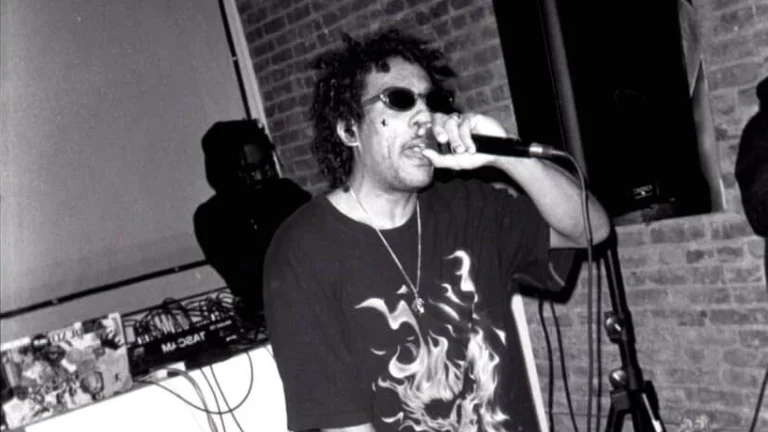The museum I work for recently hosted the exhibition Doors by artist Christian Marclay, a video piece that was roughly an hour of film clips, all of people entering and exiting doors. Its room was set up like a mini movie theatre, with the large screen dwarfing a series of benches inviting you to sit down and get sucked in. The clips were organized in subsections, centering around colors, genres, and themes—my personal favorite section included Twin Peaks: Fire Walk With Me, transitioning into American Psycho, then into Scream. Visitors reacted with a sense of awe, like they were stepping out of a portal to another world. The editing was so seamless and the room so intimate that even though it restarted after about an hour and many of the clips repeated, they’d get stuck in this dimension, completely made up of people coming and going, never quite satisfied with where they are. They did not get lost in any one clip individually, but rather the full, edited together world that turned into its own captivating project—the precise feeling I get from The Radiant Radish, Illinois-based musician Jetski’s latest variety show of an album.
Jetski, otherwise known as Ian Ostaszewski, is a producer who appears on many Illinois-centric projects, remixing his friends’ work, such as diana starshine’s glitchcore fairy pop or Eprom’s dubstep-adjacent Thank You, Dream Girl. His style has always pulled from previous work, almost neurotically categorizing as many royalty-free soundbites as possible. His first album, Reflex Engine, has the same sample-heavy concept as his latest, but you can distinctly hear the improvement between the two. It feels much more harried than The Radiant Radish, leaning harder into the novelty of clashing clips. This latest release has a clearer vision of its madness, managing to create cohesive threads behind the cacophony and put on display just why this is his approach to “songwriting.”
The Radiant Radish is the pinnacle of this obsession, right down to the very album name. It references the Beach Boys’ very own Brian Wilson’s short-lived health food store, marked by irregular hours and Wilson’s consistent, offbeat presence within. Many fans of Wilson call this time just as experimental as his Pet Sounds era, where he focused his energy towards healthy living and a sense of zen rather than music. While I wouldn’t call the album of the same name particularly calming, the repetitiveness of such constant noise fulfills a similar purpose for Ostaszewski, hypnotizing you with overstimulation.
This trance is immediately invoked on the first track, “Speed Zoo,” opening with a sonic scrambling characterizing most of the album. Switching between sounds too fast for any one bit to stand out, it creates the effect that you’re inside the soundwaves themselves, only witnessing their frequencies. All you can truly focus on throughout are piecemeal sound effects and varied jazzy horn riffs, like some sort of cutaway gag. I can’t help but feel like I dove into an early 2000s computer, flying past the era rather than being a part of it. A rose-tinted simulacrum. Nonetheless, “Speed Zoo” doesn’t come off as disconcerting due to the undercurrent of muttered words here, switched past too quickly to ever make them out. Most are spat out by a deeper male voice, a similar sound to beatboxing. With hyperpop music on the rise, many listeners have become more familiar with experimental music. For even the biggest noise fanatics, though, Jetski’s work is that at its most extreme. Diving into his crazed curation for the first time could be hard without something to ground you, making it a relatively accessible intro to the album. The song’s feature of some type of human connection allows listeners to feel not so alone, like there’s someone else alongside them for such a wild ride.
“Silent Running”, the next track, does almost the total opposite, purposefully putting you on edge. It’s an immediate stark contrast from “Speed Zoo,” the two songs destined to be next to each other. The ordering of songs on The Radiant Radish is as intentional as the compiling of the sounds themselves, designed to abruptly throw you from headspace to headspace when going through in order. While listening to the song over and over, I found myself going slowly insane, my mind abstracting along with the music. It opens with an echoey elevator alarm, welcoming you into its descent into absurdity. The few instrumental chords that do exist here—once again, primarily trumpets—continuously slip out of the listener’s grasp, making way for popping balloons and computers rebooting. The soundscape reminds me of the episode of SpongeBob SquarePants where Squidward accidentally travels to the future, particularly when he’s transported to the world of emptiness. The echoey sounds recreate the sterile atmosphere Squidward finds himself stuck in, and I can easily imagine the repeated disembodied chants of “alone” he starts to hear naturally fitting in with the track. As the introduction to this album, “Speed Zoo” and “Silent Running” are so diametrically opposed, like Jetski is demonstrating the full gamut of abstraction in music, so listeners can begin to understand its range.
“Bucking Broadway,” then, is one of the most cohesive tracks, displaying a pretty straightforward message amidst its chaos. The first noises are an electronic thrumming, reminiscent of action movies like The Matrix. Immediately, it recalls some post-apocalyptic, dangerous world, possibly with a great evil lurking. In the first few seconds, this couldn’t seem further from the truth, with hot guitar riffs and throbbing club beats mixed behind brief quotations, declaring things like, “There are no bounds to what man’s creative ingenuity can accomplish,” a stereotypical praising of current technologies plucked from a Manifest Destiny-fueled drama. But before that even has enough time to sink in, another voice interrupts, yelling about the “dictatorship of the proletariat,” hinting at the subjugation behind modern marvels. This drastic turn quickly disappears, covered by almost cartoonish caricatures of stereotypically “cool” sounds—saxophone horns being blown for just a bit too long and alien beeps calling out to another world. The broadcast, which continues referencing political proceedings and organizing, fades into background noise, but remains in that background for much of the song, as everything else is mixed in faster and faster variations, flipping between trains of thought quicker than ever.
This song is almost the exact experience I have scrolling through TikTok or Instagram before I get out of bed in the morning. Every few story posts or videos, there’s a fundraiser for food and support overseas, or to help a struggling business owner right in my own community. And then the post right after markets me the newest version of Labubus. It’s impossible to focus on just one thing in this digital landscape, particularly if that one thing is a complex, serious topic like our socio-political landscape. “Bucking Broadway” serves as the perfect auditory representation of this, devolving itself further and further into nonsense until the furthest thing from the listeners’ minds is any type of political nonsense.
The Radiant Radish doesn’t stay serious for long, however. Ostaszewski certainly has some strong takes if his Twitter account is anything to go by, but not many that truly jump out at you here. Much of his music takes the route his online presence does, referencing old media to comment on modern mayhem, or vice versa. “Gumshoe” is the best example of this, juxtaposing a noir film with slapstick comedy. As the leading lady of the movie cries out, “I don’t think we’re alone!” the melancholic string music has barely a moment to settle before it’s interrupted by Tom and Jerry-esque running sound bites. The two vibes fight for dominance the whole song, much like comedic mystery movies such as Clue. Just like the film, this song has no definitive reveal at the end explaining all of its insanity. Instead, it closes out on higher and higher pitches of the telltale sound of slipping on a banana peel, a perfectly unsatisfying ending to an album refusing to feed you any simple reasonings.
At an estimated 4,000 to 4,500 samples used in this project, Ostaszewski has undeniably created something masterful with The Radiant Radish. The digital age is all about taking references from disparate contexts and finding ways they can be brought together. This album has boiled that down into song form, combining classical orchestral and freestyle jazz, monotone elevator music, and a DJ’s favorite tracks. Some even come close to fitting into the original style they primarily take from, like the revitalization of dance and R&B hits in “Point Blank,” different clips ordered in a way suggesting Jetski has a keen sense of how to craft a setlist for the perfect night out. After listening to the project a few times, you can pinpoint just how organized it all truly is, despite the disarray. While steeped in online culture, it’s undeniably manmade.





